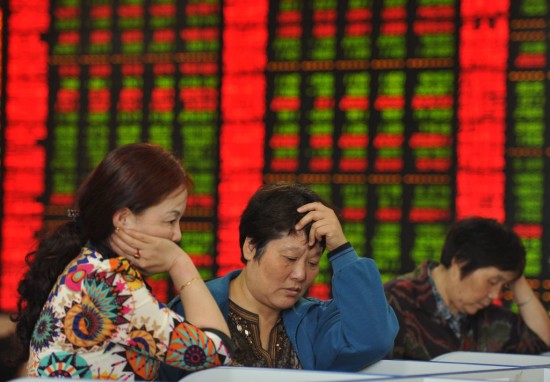Chaos erupts again on China’s stock markets
Editorial from socialist newspaper Offensiv, weekly of the CWI in Sweden
Just when the world’s elite were sounding the ‘all clear’ the Shanghai stock exchange plummeted again. On Monday 27 July Chinese stocks fell by 8.5 percent – the biggest decline in a single trading session since the year 2007, and the second biggest fall ever in China. Even the following day stocks in Shanghai and Shenzhen fell again.
The recent slump comes on the heels of a sharp decline by over 30 percent in the value of the Chinese stock markets from mid-June until well into July, which sent shockwaves through global finance markets. Not least within China’s ruling group signs of panic and desperation were evident. For many of China’s 90 million small investors the stock market crash has been a disaster.
“The last time we saw a fall of 30 percent in 16 trading days in China was in the late 1990s, so it’s the biggest crash in 20 years. Many in China now compare it with what happened to Wall Street in the 1930s,” said Amy Yuan Zhuang, Asia analyst at Nordea bank in Singapore, quoted in Dagens Industri.
On the financial markets there is legitimate concern that the debt mountain created by China’s bubble economy could result in a crisis that is “worse than in the US in 2007 and the subprime crash.”
Beijing responded to June’s stock market crash by launching various support programs to lift stock prices and calm the “market”. But the effects of the rescue measures and panic bailout by the regime proved to be short-lived.
Suspicions over GDP data
Matters were not helped when the regime claimed in mid-July that China’s GDP rose by 7.0 percent in the second quarter of 2015, compared with the corresponding quarter last year. There are few if any who believe this allegedly continued high rate of growth. And no sooner had the government presented its doctored growth figures when the news was announced that “China’s factory sector contracted by the most in 15 months in July as shrinking orders depressed output, according to a preliminary purchasing managers’ index from Caixin and Markit.” (Reuters, July 24)
On 27 July news agency TT reported, “diminishing profits from the industrial sector reinforced fears that China’s economic slowdown is about to deepen further.”
Even if further support measures get share prices to rise again there still remains the unprecedented crises of overcapacity and overproduction created in China, which acts as an increasingly powerful brake on economic growth in both China and the rest of the world. And reduced growth inevitably means the crisis and divisions within the Chinese dictatorship will worsen.
That the current crisis in China developed simultaneously with the deepening of economic crises in other so-called emerging countries like Brazil, Russia and Turkey, together with the continuing Eurocrisis increases the woes facing global capitalism. Now that even China’s peculiar form of state capitalism has run into a dead end deprives world capitalism not only of its main growth engine, but also a celebrated model that governments and capitalists around the world wanted to copy. Instead of being the saviour of world capitalism, China is now on its way to become a major source of both instability and new global crises as well as mass revolts and socialist awakening.





